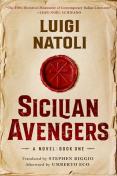BKMT READING GUIDES
Sicilian Avengers: Book One
by Luigi Natoli, translated by Stephen Riggio
Paperback : 480 pages
1 club reading this now
0 members have read this book
Emerging from the dark streets and subterranean caves of Palermo, the Beati Paoli, masked and hooded, mete out their own form of justice to ...
Introduction
A thrilling Sicilian saga about the legendary secret sect purported to be forerunners of the Mafia, translated into English for the first time.
Emerging from the dark streets and subterranean caves of Palermo, the Beati Paoli, masked and hooded, mete out their own form of justice to counter the unfettered power and privilege wielded by the aristocracy. For the voiceless, weak, and oppressed, the Beati Paoli are defenders and heroes.
Reminiscent of a Dumas novel, Sicilian Avengers is a vibrant, atmospheric fresco of early eighteenth-century Palermo. Onto the stage of the ancient city, Blasco da Castiglione, a bold, brash, orphan adventurer, arrives on a quest to discover his origins and seek his destiny. But this fearless, swashbuckling D’Artagnan-esque hero unwittingly gets caught up in a devious and murderous succession plot involving a powerful noble family.
When the Beati Paoli hear about this plot to usurp a rightful inheritance, they spring into action. Their shadowy machinations entangle the charismatic Blasco, who crosses paths with a cast of characters that test his loyalty and resolve in the pursuit of his true identity.
The historical accuracy of the novel is complemented by the most meticulous description of Sicily’s capital city ever written. Action-packed and laced with intrigue and chivalrous duels, Sicilian Avengers is a tale of love and hatred, friendship and betrayal, suffering and retribution.
As French critic Jean Noël Schifano said, Natoli's novel is “the fifth historical monument of contemporary Italian literature.”
Book 1 of 2 that includes an afterword by Umberto Eco.
Editorial Review
No Editorial Review Currently AvailableExcerpt
Chapter 10In the antechamber a footman told Blasco that the Cavaliere della Floresta had had to go home because he had suddenly felt ill, and so as not to disturb Blasco, he had left without saying anything to him. Blasco threw his cape over his shoul- ders and went out. Midnight had sounded; along Via Lungarini, in the piazzetta near the Correria1 (now Piazza Cattolica), there was an endless line of portantine and carriages, next to which grooms and volanti were strolling or relaxing. A few lit torches affixed to a wall gave off just enough light to avoid bumping into someone or stumbling. Blasco didn’t have anyone waiting for him; he had neither a carriage nor a litter nor a portantina, nor servants with torches or lanterns to light up his path. He walked along the entire line of these equipages and started off all alone toward Sant’Anna. It was a beautiful moonlit night; on one side the houses were softly lit, and the spacious street was half in shadow. He crossed the piazza and went beyond the church, thinking about that unusual opera, where the poet seemed to have foreshadowed the little drama that had taken place between him- self, the duchess, and the Prince of Iraci. The facade of the Church of Sant’Anna was immersed in shadow, and its shadow projected over half the piazza. ...
Discussion Questions
From the publisher:1. When you think of Sicily, what images, sensations, or feelings come to mind?
2. Who are the Beati Paoli and what organization(s) would you compare them to, which operate elsewhere in the world today?
3. What is the most memorable and moving scene from Sicilian Avengers, and how does the author’s writing style achieve this impact on the reader?
4. Which positive or negative character traits of individuals or groups in the narrative are most jarring in juxtaposition, and why?
5. Imagine yourself playing a part in this story. Who would you play? What draws you to them?
6. How do tensions between the privileged and the disenfranchised manifest themselves in the narrative?
7. What remnants of the social and cultural heritage of the eighteenth century persist to this day in Sicily?
Book Club Recommendations
Recommended to book clubs by 0 of 0 members.
Book Club HQ to over 90,000+ book clubs and ready to welcome yours.
Get free weekly updates on top club picks, book giveaways, author events and more








